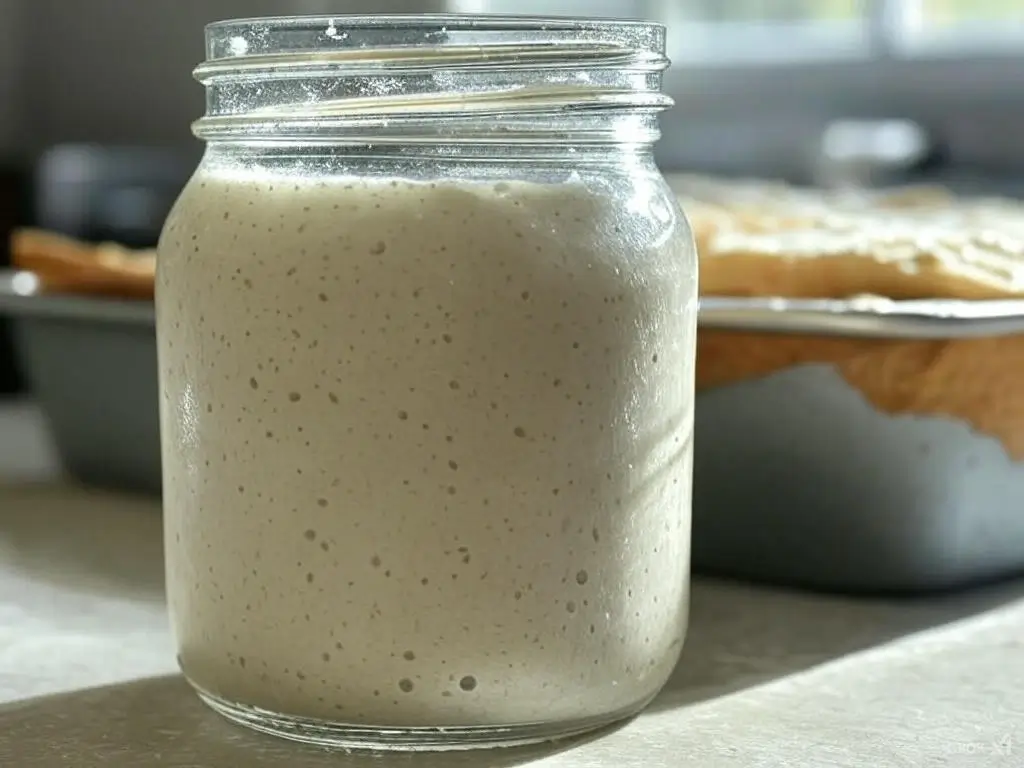Can you enjoy a slice of cake without compromising your health goals? Well, here’s some food for thought—sourdough cake. This article dives deep into answering the question: Is sourdough cake healthy? We’ll explore its origins, nutritional content, potential health benefits, and suitability for special diets, and we’ll even share tips on baking your own at home. Whether you’re looking to indulge guilt-free or simply curious about this fermented treat, we’ve got all the details covered. Let’s get started!
Is Sourdough Cake Healthy? An Introduction to Sourdough and Its Origins
What is Sourdough?
Regarding baking, sourdough is one of the oldest and most traditional methods. Unlike conventional bread made with commercial yeast, sourdough relies on a natural fermentation process involving wild yeast and lactic acid bacteria. This unique approach gives sourdough its distinctive tangy flavor and texture, making it a favorite among bakers and food enthusiasts.
The History of Sourdough
Sourdough has been around for thousands of years, dating back to ancient Egypt where early civilizations discovered how to harness the power of wild yeast for leavening bread. Over time, different cultures developed variations, adding local flours and techniques to create unique flavors. Today, sourdough remains popular not just for its taste but also for its perceived health benefits, sparking curiosity about whether these advantages extend to desserts like cakes.
Discover what was Julia Child’s favorite cake in our detailed article: What Was Julia Child’s Favorite Cake?
How Sourdough Differs from Other Fermented Foods
While many fermented foods, such as yogurt and kimchi, are celebrated for their probiotic properties, sourdough takes things further. During the long fermentation process, the starches in flour break down into simpler sugars, enhancing digestibility and nutrient availability. Compared to other baked goods that rely on refined ingredients, sourdough offers a more wholesome alternative—a key reason why people ask, “Is sourdough cake healthy?”
Why Choose Sourdough for Baking?
Choosing sourdough over conventional recipes isn’t just about following trends; it’s about embracing quality. Sourdough-based products often contain fewer additives and preservatives, which makes them appealing to those seeking cleaner eating options. Plus, its rich, complex flavor profile adds depth to any dessert, turning an ordinary cake into something extraordinary.
Unique Flavor Profile Contributing to Healthier Desserts
The secret behind sourdough’s charm lies in its fermentation process. As the dough ferments, it develops a robust flavor that can reduce the need for excessive sugar or fat in recipes. For instance, a well-made sourdough cake might require less sweetener while still delivering satisfying results. So, if you’re wondering if sourdough cake is healthy, consider this: It could help satisfy your sweet tooth without derailing your diet.
Is Sourdough Cake Healthy? Investigating the Nutritional Content

Nutrient Composition of Sourdough Cake
When we talk about sourdough cake, one of the first questions that comes to mind is, “What’s in it?” Understanding its nutrient composition can help clarify whether sourdough cake fits into a balanced diet. Like traditional cakes, sourdough cake contains carbohydrates, proteins, fats, and fiber—but with a twist. The fermentation process in sourdough baking enhances these nutrients, making them more bioavailable to the body.
Calories, Carbs, Protein, Fiber, and More
Sourdough cake typically has fewer refined sugars than regular cakes because the fermentation process partially breaks down the starches into simpler forms. This means you might not need as much added sugar to achieve sweetness. Additionally, if whole grains are used, the cake will provide a good amount of fiber, which supports digestion and keeps you feeling full longer.
Comparing Sourdough Cake to Traditional Cakes
One significant advantage of sourdough cake over traditional cakes is its lower glycemic index (GI). Foods with a low GI release glucose more slowly into the bloodstream, preventing sudden spikes in blood sugar levels. For individuals concerned about maintaining stable energy levels or managing conditions like diabetes, this characteristic makes sourdough cake a potentially healthier option.
Ever wondered why tiramisu is so delicious ? Find out here: Why Is Tiramisu So Delicious?
How Does Sourdough Fermentation Impact Nutrition?
The magic of sourdough lies in its fermentation process. During this time, lactic acid bacteria and wild yeast work together to break down complex compounds in the flour. One result is enhanced bioavailability of minerals such as magnesium, zinc, and iron—nutrients that are often harder for our bodies to absorb from non-fermented foods.
This improved absorption could make sourdough cake a better choice than standard cakes when it comes to supporting overall health. So, if you’re asking yourself, “Is sourdough cake healthy?” consider the nutritional upgrades brought about by fermentation.
Is Sourdough Cake Healthy? Potential Health Benefits Explored
Supporting Gut Health with Sourdough
Our gut microbiome is crucial in everything from digestion to immune function. When it comes to promoting gut health, sourdough shines due to its probiotic effects. The beneficial bacteria in sourdough fermentation produce compounds that nourish the gut lining and support microbial diversity.
Probiotic Effects of Sourdough Fermentation
These probiotics aren’t just limited to bread; they extend to any product made using sourdough starter, including cakes. Consuming sourdough-based desserts may contribute to a healthier gut environment, reducing symptoms associated with digestive issues like bloating or irregularity.
Indulge in a unique dessert with this recipe for a fermented sourdough chocolate cake : Fermented Sourdough Chocolate Cake
Can Sourdough Cake Help Manage Blood Sugar Levels?
Another area where sourdough stands out is its impact on blood sugar management. Studies have shown that consuming sourdough products, even those containing carbohydrates, leads to more minor fluctuations in blood glucose compared to eating refined alternatives. This benefit stems partly from the slower digestion rate of sourdough, thanks to its lower GI.
For people looking to maintain steady energy levels throughout the day—or manage conditions like type 2 diabetes—this quality makes sourdough cake an appealing treat. Of course, moderation remains key, but swapping out conventional sweets for sourdough versions could be a step in the right direction.
Reducing Heart Disease Risk Through Diet
Heart health is another aspect worth considering when evaluating whether sourdough cake is healthy. Whole grains and fermented foods, both central components of sourdough recipes, have been linked to reduced risks of cardiovascular diseases. These foods tend to lower cholesterol levels, improve blood pressure regulation, and decrease inflammation.
Role of Whole Grains and Fermented Foods in Cardiovascular Health
If your sourdough cake incorporates whole grains instead of refined flour, it becomes an even more potent ally for heart health. Entire grains retain their bran and germ layers, providing essential fatty acids, antioxidants, and fiber—all vital for protecting against heart-related ailments. Combining these ingredients with the benefits of fermentation creates a surprisingly nutritious dessert.
Learn more about the shelf life of this popular dessert with: How Long Does Matcha Tiramisu Last?
Is Sourdough Cake Healthy? Considerations for Special Diets

Sourdough Cake and Gluten Sensitivity
For individuals with gluten sensitivities, whether sourdough cake is healthy becomes particularly relevant. While sourdough isn’t entirely gluten-free, studies suggest its fermentation process can significantly reduce gluten content compared to regular baked goods. This makes it a more tolerable option for those with mild gluten intolerance or non-celiac gluten sensitivity.
Reduced Gluten Content Through Fermentation Process
The magic happens during the long fermentation period when lactic acid bacteria break down gluten proteins into smaller, easier-to-digest components. As a result, many people who struggle with conventional wheat-based products find they can enjoy sourdough without adverse reactions. However, it’s important to note that this doesn’t apply to those with celiac disease, as even trace amounts of gluten can trigger symptoms.
Is Sourdough Cake Suitable for Low-FODMAP Diets?
Another group that may benefit from sourdough cake is individuals following a low-FODMAP diet. FODMAPs are short-chain carbohydrates that can cause digestive discomfort in some people. The fermentation process in sourdough baking reduces these compounds, making it a friendlier choice for those with conditions like irritable bowel syndrome (IBS).
Explore the health benefits of sourdough and why it’s a nutritious choice: Health Benefits of Sourdough
Benefits for Individuals with IBS or Similar Conditions
Research shows that sourdough bread—and, by extension, sourdough cake—can be easier on the digestive system due to its prebiotic properties and reduced FODMAP levels. These benefits make it an appealing alternative for anyone seeking to manage gastrointestinal issues while enjoying tasty treats.
Recipes and Tips for Making Healthy Sourdough Cake at Home
Easy Sourdough Cake Recipe Ideas
Now that we’ve explored the health aspects of sourdough cake, let’s dive into how you can create your own at home! One of the best things about baking with sourdough is its versatility. You can experiment with various flavors and ingredients to suit your taste preferences while keeping things nutritious.
Incorporating Whole Grains and Natural Sweeteners
To maximize the health benefits, consider using whole grain flour such as spelled, rye, or oat flour in your recipes. These alternatives add fiber and nutrients, enhancing the overall value of your cake. Additionally, opt for natural sweeteners like honey, maple syrup, or mashed bananas to reduce refined sugar intake.
Tips for Perfecting Your Sourdough Bake
Perfecting a sourdough cake requires patience and attention to detail. Here are a few tips to help you achieve success:
- Feed Your Starter: Ensure your sourdough starter is active and bubbly before incorporating it into your batter. A lively starter will provide better leavening and flavor.
- Experiment with Flavors: Adding nuts, dried fruits, or spices can elevate your cake’s taste profile without compromising health.
- Don’t Overmix: Gentle mixing prevents the cake from becoming dense, ensuring a light and airy texture.
Following these guidelines, you can craft delicious, homemade sourdough cakes that align with your dietary goals. Whether you want to satisfy a sweet craving or explore new baking techniques, sourdough offers endless possibilities. So why not give it a try? After all, if sourdough cake has been on your mind, you have the tools to make it work for you!
Try this amazing fusion recipe by exploring: Sourdough Chocolate Cake Simple Recipes
FAQs Section
Is sourdough ok for weight loss?
Yes, sourdough can be a good option for weight loss when consumed in moderation. Sourdough bread is often lower on the glycemic index (GI) compared to regular white bread, meaning it causes a slower and more gradual rise in blood sugar levels. This can help you feel fuller for longer, potentially reducing overall calorie intake. Additionally, the fermentation process used in making sourdough can enhance the digestibility of the bread and improve nutrient absorption.
Is sourdough healthier for you than regular bread?
Sourdough bread is generally considered healthier than regular bread for several reasons:
Better digestion: The natural fermentation process breaks down some of the complex carbohydrates and gluten in the dough, making it easier to digest.
Higher nutrient availability: The lactic acid bacteria in sourdough can increase the bioavailability of certain minerals like iron, zinc, and magnesium.
Lower glycemic index: Sourdough tends to have a lower GI than regular white bread, which can help regulate blood sugar levels.
Probiotic benefits: While not as potent as yogurt or other fermented foods, sourdough contains beneficial bacteria from the fermentation process, which may support gut health.
Is sourdough a good or bad carb?
Sourdough is generally considered a “good carb” because of its lower glycemic index and improved nutrient profile compared to many other types of bread. Good carbs are those that provide sustained energy and come with additional nutrients, such as fiber, vitamins, and minerals.
What is the disadvantage of sourdough bread?
While sourdough has many benefits, there are a few potential downsides to consider:
Calorie-dense: Like all bread, sourdough is calorie-dense, so overeating it can lead to weight gain if you’re not mindful of portion sizes.
Takes time to make: Sourdough requires a longer preparation time due to the fermentation process, which might not be practical for everyone.
Cost: Store-bought sourdough can be more expensive than regular bread because of the labor-intensive process involved in making it.
May still cause issues for some people: Although sourdough is easier to digest for many, individuals with celiac disease or severe gluten sensitivity should avoid it unless it’s made with gluten-free grains.
Taste and texture: Some people may find the tangy flavor or dense texture of sourdough less appealing than regular bread.
Conclusion:

In conclusion, exploring whether sourdough cake is healthy reveals that it offers several nutritional advantages over traditional cakes. Its lower glycemic index, enhanced mineral bioavailability, and potential gut-supporting properties make it an appealing choice for health-conscious bakers. While not entirely free from calories or carbs, the unique fermentation process in sourdough can reduce gluten content and improve digestibility. With thoughtful ingredient choices, sourdough cake can be both indulgent and nutritious, fitting into balanced eating plans.
Get creative with your baking by checking out: Can I Add Sourdough to Box Cake Mix?






